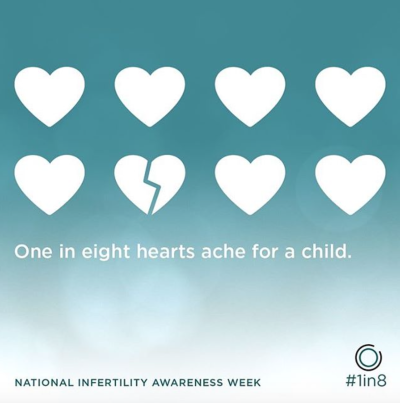
National Infertility Awareness Week is also known as #NIAW. Pink and blue awareness pins are used to raise awareness about infertility.
Infertility Support Groups
Infertility has become more visible in recent years with the help of online support groups and social media platforms. Those currently battling infertility can all virtually get together to discuss their experiences and lend one another support or offer tips. The hashtag #ttc, which stands for trying to conceive, is one of the most popular infertility hashtags.
Infertility can be a very isolating and lonely experience for couples, in part due to the stigma surrounding the issue. Many people experience feelings of shame or inadequacy when they are unable to conceive naturally. As a result, they don’t talk openly about it with other people. One in every eight couples, however, experiences infertility. A couple is classified as experiencing infertility if they have been unable to become pregnant after over a year of unprotected sex.
Infertility can be a little tricky to navigate. It can be caused by reproductive issues in either person, both, or it can be caused by a laundry list of other factors. National Infertility Awareness Week calls attention to these issues.
Here’s an overview of causes. Since men and women have different anatomy, the causes will be separated by gender:
Things that can cause infertility in men include:
- The sperm itself: under-production of sperm, or limited function of the sperm.
- The delivery of the sperm: sometimes vessels can be blocked or there can be structural abnormalities.
- The environment: overexposure to things like saunas, or Jacuzzi’s, can affect the body’s ability to produce sperm.
- Overuse of harmful substances: alcohol, cigarettes, marijuana, and metabolic steroids.
- Other health problems, and respective treatments: one major example of this is cancer and the resulting impairment of sperm production from chemotherapy or radiation.
Things that can cause infertility in women include:
Additional infertility issues in women:
Risk factors that apply to both men and women:
- First and foremost, there is the issue of age. As women age, especially after a woman hits her mid 30’s, fertility swiftly declines. But, there is also a lot of evidence to suggest that men may also become less fertile after 40.
- Smoking.
- Alcohol.
- Being overweight and sedentary, or not active, can contribute to infertility in both men and women.
- Being underweight is just as much of an issue as being overweight.
- Exercise. If you’re struggling with infertility and exercise isn’t really your thing, it may be time to reassess.
#infertility #NIAW #national #infertility #awareness #week #oneineight #knowmore #customawarenessribbons #awareness #awarenessribbons #pinkandblueribbon
